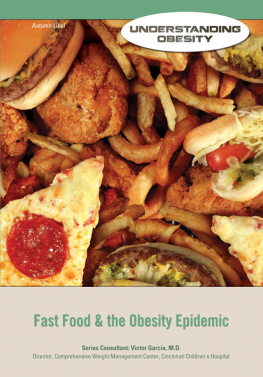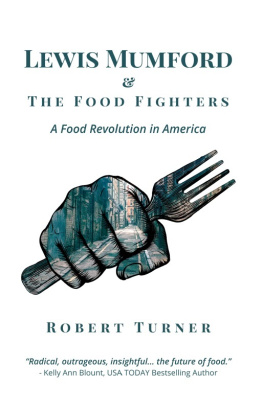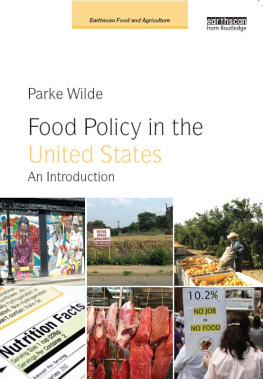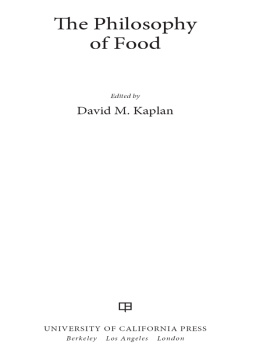FIXING THE FOOD SYSTEM
Changing How We Produce and Consume Food
Steve Clapp
Foreword by Marion Nestle

Copyright 2017 by Steve Clapp
All rights reserved. No part of this publication may be reproduced, stored in a retrieval system, or transmitted, in any form or by any means, electronic, mechanical, photocopying, recording, or otherwise, except for the inclusion of brief quotations in a review, without prior permission in writing from the publisher.
Library of Congress Cataloging-in-Publication Data
Names: Clapp, Steve, 1938 author.
Title: Fixing the food system : changing how we produce and consume food / Steve Clapp ; foreword by Marion Nestle.
Description: Santa Barbara, California : Praeger, [2017] | Includes bibliographical references and index.
Identifiers: LCCN 2016029142 (print) | LCCN 2016030914 (ebook) | ISBN 9781440843709 (hard copy : alk. paper) | ISBN 9781440843716 (EISBN)
Subjects: | MESH: Nutrition Policy | Food Industry | Food Safety | Food economics | United States
Classification: LCC TX359 (print) | LCC TX359 (ebook) | NLM QU 145.7 AA1 | DDC 363.8/561dc23
LC record available at https://lccn.loc.gov/2016029142
ISBN: 978-1-4408-4370-9
EISBN: 978-1-4408-4371-6
21 20 19 18 17 1 2 3 4 5
This book is also available as an eBook.
Praeger
An Imprint of ABC-CLIO, LLC
ABC-CLIO, LLC
130 Cremona Drive, P.O. Box 1911
Santa Barbara, California 93116-1911
www.abc-clio.com
This book is printed on acid-free paper 
Manufactured in the United States of America
Contents
Foreword
In this welcome addition to my library of books about food policy and politics, Steve Clapps Fixing the Food System reviews the past and current history of calls for a national food policy, the most contentious controversies over food and nutrition issues that have impeded development of such a policy, and the work of advocates to achieve one. As this book makes clear, this history began decades ago.
I first became aware of the importance of federal food policies in the early 1980s when I was teaching nutrition to medical students at the University of CaliforniaSan Francisco (UCSF). First-year students were eager to learn about nutrition, but for personal more than for professional reasons. They wanted to know what theyand the patients whose health problems they were learning to treatshould eat. But by the time they were residents, I could see their dietary concerns vanish under the daily demands of patient care. Trying to advise about diets was too difficult, time-consuming, and financially unrewarding to be worth the trouble. It seemed unreasonable to expect doctors to take the time needed to counsel individual patients about the prevention of diet-related conditionsheart disease, type 2 diabetes, cancer, and the like. If nutritionists like me wanted to focus on disease prevention rather than treatment, we would have to advocate to change the food environment to make healthful food choices the easy choiceseven better, the preferred choices. This meant we would have to advocate for food and nutrition policies aimed at promoting public health.
of government programs and their wide disbursement among numerous agencies and departments.
Our article quoted the earliest calls we could find for a national policy to address these problems. In 1974, long before the term food system came into common use, the National Nutrition Consortium of four leading nutrition and food science societies argued for a national nutrition policy that would
- Assure an adequate, wholesome food supply, at reasonable cost, to meet the needs of all segments of the population;
- Maintain food resources sufficient to meet emergency needs and to fulfill a responsible role as a nation in meeting world food needs;
- Develop a level of sound public knowledge and responsible understanding of nutrition and foods that will promote maximal nutritional health;
- Maintain a system of quality and safety control that justifies public confidence in its food supply;
- Support research and education in foods and nutrition with adequate resources and reasoned priorities to solve important current problems and to permit exploratory basic research.
Whether offered as nutrition or food policies, these were and remain highly appropriate goals for an abundant, healthy, safe, and effective food system.
My coauthors and I went on to identify the constraints that then limited government action to achieve such goals. Despite an emerging consensus on the basic elements of healthful dietsfruits and vegetables, balanced calories, not too much junk food (as Michael Pollan put it more recently, eat food, not too much, mostly plants was the controversy over the science of diet and health. As our article understated this issue, The effect on the nations health of food processing and other changes in the U.S. diet is controversial. Salt, sugar, fiber, saturated fats, alcohol, caffeine, calories, vitamins, and food additives all elicit vigorous debate.
Today, more than 30 years later, we are still arguing about that science and the scientific arguments still impede policy development. In Fixing the Food System , Steve Clapp brings us up to the minute on federal progress (or the lack thereof) toward achieving a clearly articulated national food policy. He begins and ends his book with the most recent policy proposals from leading food advocates Michael Pollan, Mark Bittman, Olivier de Schutter, and Ricardo Salvador. Their recent suggestions for improving our current food system reflect the many changes in agricultural production and food consumption that have taken place since 1974 but retain the basic elements of those earlier proposals. Fixing the Food System explains why a national food policy is so badly needed and matters so much.
Steve is in a unique position to comment on food policy issues. Hes been at the policy game for a long time. I dont remember when I first met him, but I have been reading his work since he reported for the Community Nutrition Institutes newsletter, Nutrition Week. For those of us outside the Beltway in those pre-Internet days, Nutrition Week was a lifeline to the ins and outs of food politics in Washington, D.C. Later, when Steve moved to Food Chemical News , alsoand stilla lifeline, I continued to read his reporting. I often ran across him at meetings and hearings in Washington, D.C., and found it instructive to read what he wrote about those deliberations, not least because he got it right.
I say all this because he has been a keen observer of the food politics scene in Washington for decades, and I cant think of anyone who ought to know it better. Fixing the Food System reviews the major debates he has witnessedthe Dietary Guidelines, of course, but also attempts to set policy for food safety, marketing to children, hunger in America, and humane treatment of farm animals, among others.
Over the years, he also has observed the work of policy advocates, and this book includes profiles of many individuals engaged in this work, some likely to be familiar to readers, whereas others may not. Impossible as it is for me to judge whatever impact my own writing and advocacy might have, I am honored to be included among those whose work he presents.
Fixing the Food System describes political arguments over the kind of food system we ought to have and what an ideal system should accomplish. But it is also about the importance of personal and political advocacy for better food policies, those aimed squarely at promoting public health and environmental sustainability.
Next page











